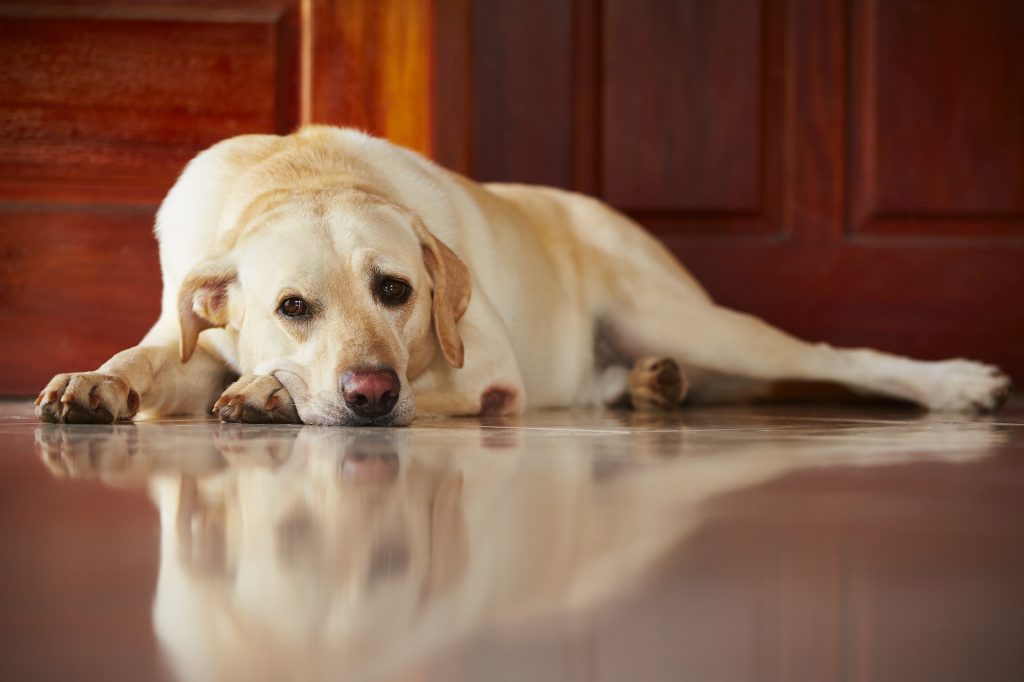Estimated reading time: 6 minutes
The emotional impact of lockdown has been difficult for all of us. We have had to change our lives in accordance with the Government restrictions and our pets have had to adapt to our new routines.
We understand the need to social distance, restrict our activities and work from home. However, our dogs and cats do not. The changes to their normal daily routine and usual activities may have caused them to become stressed and anxious.
This article explains the emotional impact of lockdown on our dogs and cats.

How life has changed
Although many of the lockdown restrictions have been relaxed, the last months have been difficult for many of us. Not being able to see family and friends or go out and exercise, and being confined to the house, are just a few of the things we have had to endure.
Our dogs have also had to adapt to limited exercise, lack of opportunities to meet and socialise with other dogs and people. The loss of expected rewards such as a run round the park, a walk in the countryside, or playtime with doggy friends will have caused an emotional impact arousal and affected the mood state of our dogs with potential behaviour changes.
Disruption in the house as owners set up workstations and face the challenges of home schooling the children is likely to have had a significant impact on the emotional state of the family cat.
Mood and emotions
Mood and emotions are interlinked and influence human and animal behaviour.
Emotions are caused by an obvious cause/signal/object/event. They are acute and short-lived and can be related to an event within the environment or a learnt association.
Moods are not associated with anything specific but are a culmination of similar emotional experiences and last for hours or days. Mood is how the animal ‘feels’ and behaves throughout the day. A dog experiencing several negative events is likely to be depressed and will be difficult to motivate. In contrast, a dog experiencing more than usual positive events is likely to be overexcited and will have a short attention span.

Signals of Reward and Non-Reward
During lockdown, our pets will have been unable to engage in normal activities. Coping strategies and irrelevant/problem behaviours may have arisen in response to learned signals of reward (predictors of pleasurable events) no longer meeting expectations.
Our pets have learned to predict events which relate to them. When we are going to feed them, when we are going to take them for a walk and when we are going to leave them at home by themselves. The clues they pick up on are the things we always do beforehand (signals), such as getting their food bowl out of the kitchen cupboard, picking the lead up (signals of reward).
In contrast, they also recognise that when we have our work clothes on and lock the back door (signals of non-reward), they will be spending some time alone in the house. Interestingly, the sound of the car leaving the drive, becomes a reliable predictor that the car and owner will return, enabling the animal to be calm and relaxed when home alone.
Prior to lockdown these signals will have been reliable predictors of events. The loss of these expected pleasures may provoke intense frustration and extreme emotional reactions. Such as:
- Increased vigour/activity
- Anger
- Rage
- Displacement behaviours
- Learned helplessness
- Resignation
- Withdrawal
Dogs may become over excitable, aggressive, begin chewing or retreat into a state of complete misery and lethargy. Cats may also become aggressive, begin spraying or self-mutilate.
Hedonic Budget/Hierarchy of Needs
Just like humans, our dogs and cats have specific requirements for a full and contented life. Obviously, physical needs such as eating, sleeping and drinking are essential for life, but often little emphasis is placed on other activities. The need for some of these other activities will be species dependent as well as varying between breed type. For example, a Border Collie will require more exercise than a Basset Hound.
If any of these needs are restricted, mood and emotional states can become disrupted and as one is reduced then another is abnormally increased. A dog may begin chewing and become destructive to overcome the lack of exercise. A cat may begin spraying to overcome the disruption of sleep patterns.

Hunting and exploring are innate needs which, for dogs, are usually part of their daily exercise routine. Investigating the undergrowth, searching for a lost toy, looking for hidden treats are all part of this. During lockdown, the opportunity to engage in these activities will have been significantly reduced, especially during the initial restrictions. Cats most certainly need to satisfy their hunting instincts and for an outdoor cat the opportunities to hunt and explore may not have changed.
Play, either with humans or other dogs/cats, is important. Play releases feel good chemicals, dogs will chase each other in the park and enjoy games with their humans. Whilst play time can still take place within the house and garden, playtime with other dogs will have been limited due to social distancing and exercise restrictions.
Cats, on the other hand, will play with other familiar cats but this is not as important as play with toys. However, in a busy household where people are working and homeschooling it may be that playtime with the family cat has been forgotten.
Human contact is important for both dogs and cats. The majority of cats enjoy interacting with their owners; however, some cats will feel that their safe territory during the day has been invaded by humans. As we continue to work from home, dogs are more likely to enjoy the constant companionship of their owners. However, as lockdown restrictions are lifted and people return to work, some dogs may not be able to cope with the imposed isolation.
Grooming (either self-grooming or by the owner) and chewing are important to both dogs and cats. But when other needs cannot be met or are disrupted in anyway, cats may over groom to the point of self-mutilation and dogs may become destructive.


